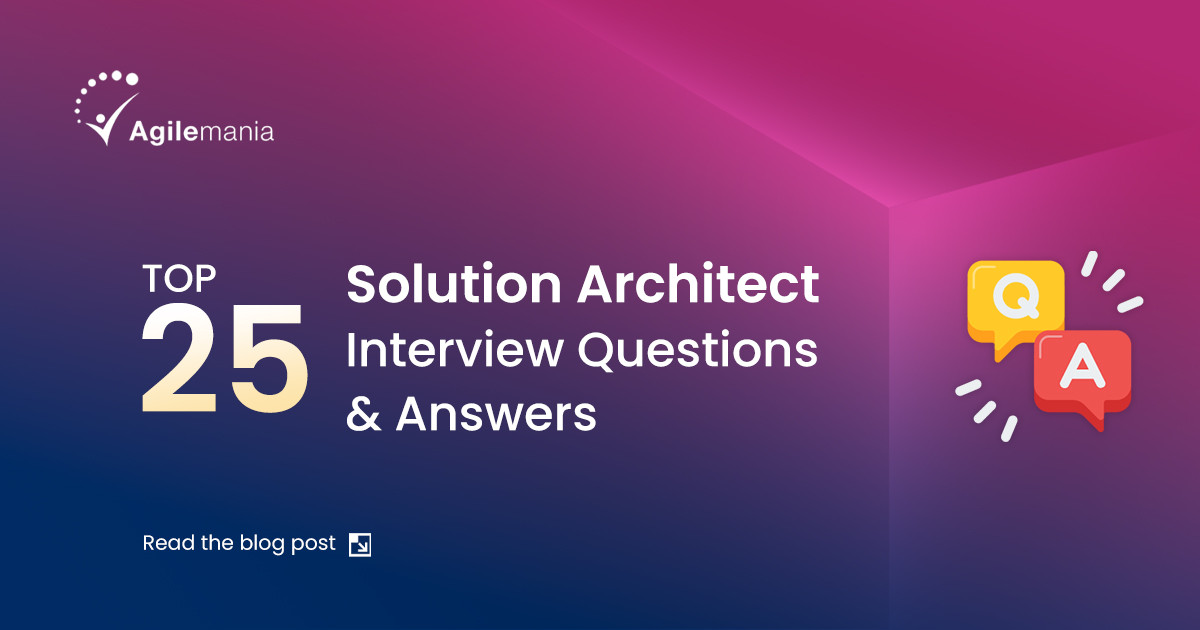
Agilemania
Agilemania, a small group of passionate Lean-Agile-DevOps consultants and trainers, is the most tru... Read more

Agilemania
Agilemania, a small group of passionate Lean-Agile-DevOps consultants and trainers, is the most tru... Read more

The Solution Architect role is a critical one in the tech world. As the bridge between business needs and technical execution, Solution Architects design, implement, and maintain complex systems. Acing your Solution Architect interview requires showcasing not only your technical expertise but also your problem-solving skills, communication abilities, and strategic thinking.
This blog dives deep into 25 of the most commonly asked Solution Architect interview questions focusing on diverse segments, providing you with insights to help you confidently navigate your interview and land your dream job.
Focus on scalability, security, maintainability, and performance.
Highlight your understanding of design patterns like microservices and event-driven architectures.
Discuss the trade-offs between Consistency, Availability, and Partition Tolerance.
Demonstrate your ability to choose the right architecture for specific scenarios.
Highlight your familiarity with core services like compute, storage, databases, and networking.
Mention any relevant certifications you hold (e.g., AWS Certified Solutions Architect).
Discuss leveraging load balancers, auto-scaling groups, and encryption best practices.
Showcase your understanding of potential security threats and mitigation strategies.
Discuss use cases for each approach and their impact on system performance.
Structure your answer using a problem-solving framework (e.g., Define-Analyze-Design-Implement-Test).
Emphasize your ability to break down complex issues into manageable steps.
Discuss tailoring your communication style to the audience and using clear, concise language.
Highlight your experience simplifying technical concepts for non-technical users.
Demonstrate your flexibility and ability to adjust designs while maintaining project goals.
Emphasize clear communication with stakeholders throughout the change process.
Discuss your experience defining clear UAT criteria and collaborating with stakeholders.
Highlight your problem-solving skills in addressing bugs and usability issues.
Showcase your proficiency in project management tools and methodologies (e.g., Agile).
Discuss prioritizing tasks, setting realistic milestones, and communicating timelines effectively.
Our comprehensive certification program is designed to equip you with the skills and knowledge needed to excel in this critical role.
Start your journey towards becoming a certified Solution Architect!
Demonstrate your understanding of how technology can drive business value.
Discuss translating business needs into concrete technical requirements.
Highlight your ability to consider not just initial costs but also implementation, maintenance, and scalability factors.
Showcase your understanding of cost optimization strategies in cloud environments.
Discuss attending industry conferences, reading white papers, and participating in online communities.
Demonstrate your commitment to continuous learning and staying relevant in the fast-paced tech landscape.
Highlight your ability to present data-driven arguments and collaborate persuasively.
Showcase your confidence in your technical expertise while being respectful of different viewpoints.
Discuss defining key performance indicators (KPIs) aligned with business objectives.
Highlight your ability to analyze data and demonstrate the solution's positive impact.
Discuss incorporating secure coding practices, access controls, and data encryption at rest and in transit.
Mention your familiarity with security frameworks like NIST or CIS.
Discuss data backup strategies, redundancy across systems, and disaster recovery testing procedures.
Briefly explain the benefits of containerization and how it can improve scalability and manageability.
Discuss using IaC tools to automate infrastructure provisioning and configuration management.
Tailor your answer to the specific team dynamics mentioned in the job description.
Highlight your ability to motivate, guide, and empower team members.
Demonstrate your genuine interest in the role and the company's mission.
Discuss how the position offers opportunities for learning and professional development.
Discuss analyzing bottlenecks, profiling code, and considering potential modernization strategies (e.g., cloud migration, microservices architecture).
Highlight your ability to conduct a thorough evaluation considering factors like cost, scalability, security, and existing infrastructure compatibility.
Discuss your collaborative skills, communication style, and ability to delegate tasks effectively.
Highlight your time management skills, ability to prioritize tasks, and maintain a calm attitude.
Becoming a Solution Architect requires a unique blend of technical expertise, strategic thinking, and business acumen. The interview process is a rigorous evaluation of these skills. We hope this comprehensive guide has equipped you with the knowledge and confidence to tackle a wide range of Solution Architect interview questions.
Remember, the key to success lies in understanding the underlying principles, applying them to real-world scenarios, and effectively communicating your thought process. Practice is essential, so don't hesitate to simulate interview conditions with a friend or mentor.
As the technology landscape continues to evolve, so too will the demands of the Solution Architect role. Staying updated with industry trends, emerging technologies, and best practices is crucial for long-term success.
Best of luck on your Solution Architect journey!
A Solution Architect is responsible for designing and implementing IT solutions that meet an organization's business needs. Their key responsibilities include understanding business requirements, translating them into technical specifications, designing system architectures, selecting appropriate technologies, ensuring alignment with enterprise architecture, and overseeing the implementation process to ensure the solution's integrity and quality.
Essential skills for a Solution Architect include strong analytical and problem-solving abilities, a deep understanding of various software and hardware systems, proficiency in cloud computing, experience with integration and data management, knowledge of security and compliance standards, excellent communication skills, and the ability to work collaboratively with cross-functional teams.
A Solution Architect starts by thoroughly understanding the business requirements and constraints. They then evaluate different architectural styles and patterns, choose appropriate technologies, and design the system architecture to ensure scalability, security, performance, and maintainability. The architect also considers integration points with existing systems and ensures that the architecture aligns with the organization's overall IT strategy.
In the software development lifecycle (SDLC), a Solution Architect plays a crucial role from the initial stages of planning and design through to implementation and deployment. They define the technical requirements, create high-level design documents, provide guidance to development teams, ensure that the solution adheres to architectural principles, and make necessary adjustments throughout the project to accommodate changes in requirements or technology.
To ensure scalability, a Solution Architect designs the system with modularity and flexibility in mind, choosing technologies that support load balancing, horizontal scaling, and efficient resource utilization. For security, they implement best practices such as encryption, authentication, and access controls, and ensure compliance with relevant regulations. Continuous monitoring and regular security assessments are also part of maintaining the solution's scalability and security over time.
Agilemania, a small group of passionate Lean-Agile-DevOps consultants and trainers, is the most trusted brand for digital transformations in South and South-East Asia.
WhatsApp Us
We will get back to you soon!
For a detailed enquiry, please write to us at connect@agilemania.com

